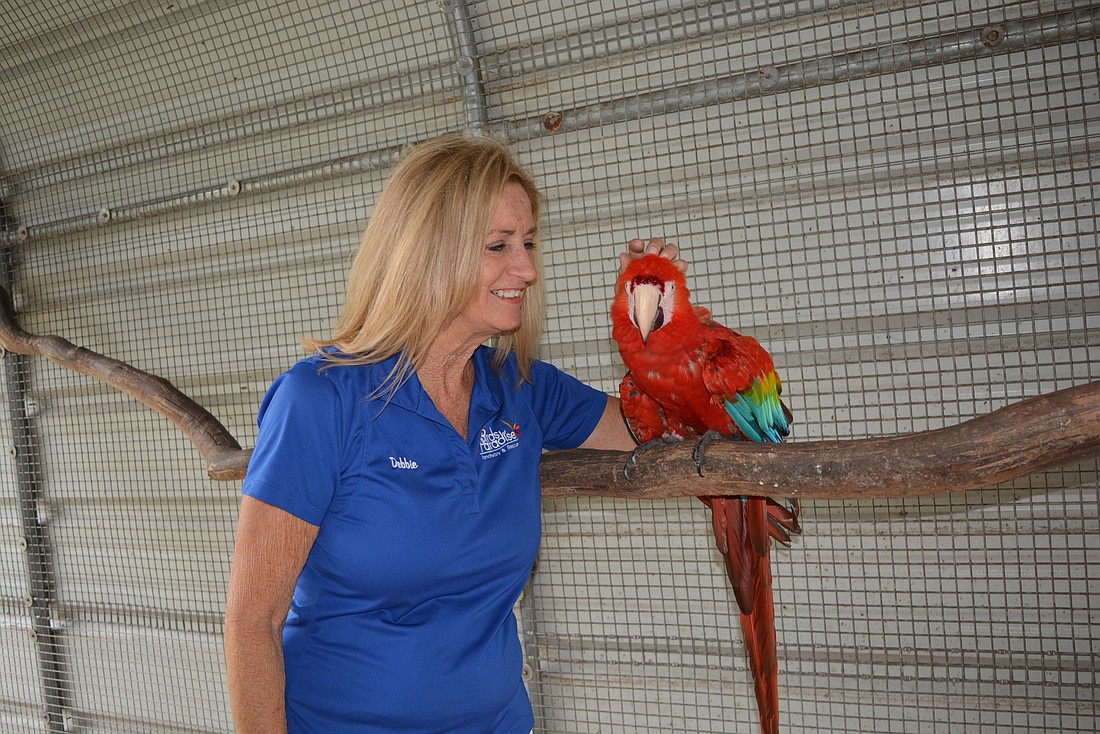- November 15, 2024
-
-
Loading

Loading

Nestled side by side, blue and gold macaws Pearl and Cocoa watched from above as Debbie Huckaby entered their aviary and called to another macaw, Harvey.
They and a dozen or so other macaw pairs watched Huckaby’s every movement as she offered Harvey a little special attention by calling him to her arm and scratching the top of this head.
For the birds, it was just a normal day with Huckaby providing attention, food and conversation and cleaning up
their messes.
However, for Huckaby, the executive director of Birds of Paradise Sanctuary and Rescue, it’s another day of uncertainty. Birds of Paradise must vacate its current home at 17020 Water Line Road by March 5, possibly sooner.
“I wanted to have a place by Oct. 1,” Huckaby said. “Time is really winding down here.”
Huckaby said she had found a donor to purchase the property, but the deal fell through. Now she’s at “square one.”
“We’re hoping to find some property that would be donated,” Huckaby said. “We will have to do a capital campaign for the move.”
Huckaby’s goal is to find a new property for the rescue, and she is searching for someone who can either purchase land for Birds of Paradise or offer it a lease.
A new property must be a minimum of 2 acres — though Huckaby prefers at least 5 — and must have a house or at least hookups for an RV to accommodate a full-time caretaker. There will need to also be water and electric available for the aviaries, which have electrical outlets for lights and water for misting systems to help keep the birds cool.
If no property can be found, Huckaby will see if other bird rescues can take some of the birds.
“Everyone keeps a few slots open for emergency situations, but not to the tune of 350 birds,” she said. “They’re full. It would put a huge burden on them, even if we could do it, but we would try.
“Plan B would be to rent a huge warehouse and put [the birds] there while we search for a proper facility,” Huckaby said. “The birds will not be abandoned on this property.”
She said moving to another site will cost about $100,000 total. At least one new aviary, which costs about $40,000, will need to be constructed, and it will take an estimated two months to build and retrofit for the birds. A large existing aviary can be reused on the future property, but it will take about one month to tear down and reassemble. Smaller aviaries can be reassembled in just a few days with the help of volunteers.
Property owners Kerry and Cindy Gordon have agreed to extend their five-year lease with Birds of Paradise by three months from Dec. 5 to March 5, if certain conditions are met, to give Birds of Paradise more time to find a new home. They purchased the Waterline Road property five years ago to provide Huckaby a place to move Birds of Paradise when it was forced to move from its home in Palmetto.
Kerry Gordon said the couple had hoped Birds of Paradise could buy the land at the end of the lease term, and it is still willing to sell to Birds of Paradise or another individual who wishes to purchase it for use by the rescue.
“I would sell it to [Huckaby] before anyone else,” Kerry Gordon said.
However, the couple is ready to end its lease with Birds of Paradise. They said the organization has struggled at times to make monthly payments, which they have absorbed, and they have also made donations to help keep the birds cared for and fed.
“The bottom line is we love and care for the birds,” Cindy Gordon said. “It’s a financial burden for us to continue with this lease. In the five years, Debbie has not shown to me that she has a sustainable operation. I would like to continue using the property as a sanctuary and possibly a local adoption center with approved protocols.”
She said placing emphasis on bird adoptions is important.
According to the IRS, Birds of Paradise has not filed a tax return since December 2016.
Huckaby admitted finances have been challenging at times, and her accountant said the 2017 taxes should be filed by the end of this month.
Huckaby said Birds of Paradise’s budget now is about $120,000 a year. Each month, she spends about $3,000 on bird food and between $500 to $2,000 on veterinary care, among other costs.
Manatee County Animal Services Division Chief Sarah Brown said if the birds were abandoned, Animal Services would work with law enforcement to place them.
“We are not equipped to house 350 birds,” she said.